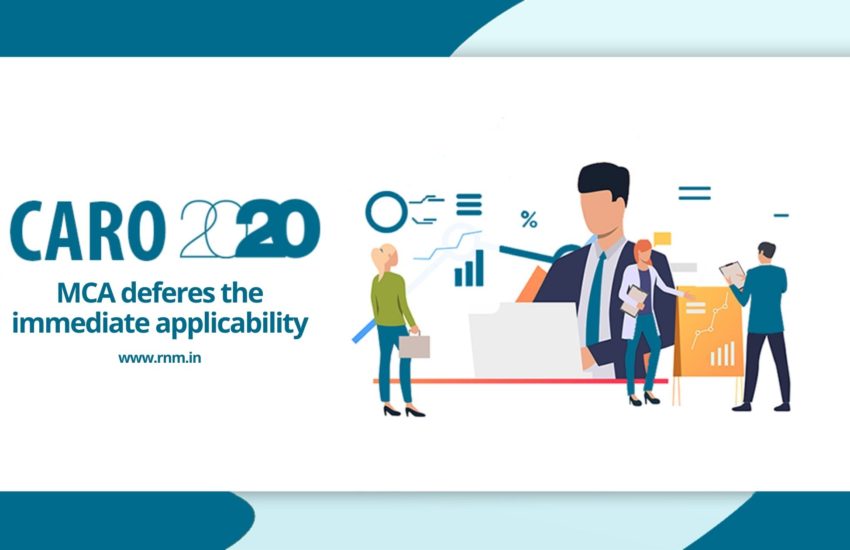The Ministry of Corporate Affairs (MCA) has deferred the applicability of the notified the Companies (Auditor’s Report) Order (CARO) 2020, till 1st April, 2021.
The notification seeks to amend the Companies (Auditor’s Report) Order, 2020. In the Companies (Auditor’s Report) Order, 2020, in paragraph 2, for the figures, letters and word “1st April, 2020”, the figures, letters and word “1st April, 2021” shall be substituted. The Companies (Auditor’s Report) Order, 2020 is applicable for all statutory audits commencing on or after 1 April 2021. The Companies (Auditor’s Report) Order, 2020 is a new format for issue of audit reports in case of statutory audits of companies under Companies Act, 2013. It has included additional reporting requirements after consultations with the National Financial Reporting Authority (NFRA). NFRA is an independent regulatory body for regulating the audit and accounting profession in India. The aim is to enhance the overall quality of reporting by the company auditors.
Ind AS 16: Capitalization of employees, rent, travelling, housekeeping expenses as a part of cost of asset
A leading public sector undertaking Entity say, B Ltd. engaged in the business of infrastructure facilities. At present, B Ltd. is engaged in one of its project of plan, design, develop, build, commission, maintain, operate and finance high speed rail services i.e. Bullet Train project. entire cost of project is funded in the form of equity – from Ministry of Railway. The Indian Accounting Standards (Ind AS) are applicable to B Ltd. B Ltd. has incurred Rs. 1500 lacs as employee benefit expenses and other expenses for corporate and project site specifically related to the project. The bifurcation of above amount is mentioned below:-
| Sr. No. | Expense Head | Amount (Rs. in Lakh) |
| 1. | Employee Benefit Expenses (finance department and project associated departments. | 700 |
| 2. | Rent Expenses (head office where project executing team including directors sit. | 430 |
| 3. | Travelling Expenses (incurred on different departments) | 250 |
| 4. | Housekeeping Expenses | 120 |
Entity had capitalized the entire expenditure incurred on above items as part of cost of Bullet Train project.
Whether the accounting treatment adopted by B Ltd. is correct as per the relevant Ind AS? If not, what should be the correct accounting treatment?
Answer
No, the accounting treatment adopted by Entity is not correct as per Ind AS 16 Property, Plant and Equipment.
Para 16 of IND-AS 16 explain the cost which can be directly considered as cost of project which is as under:-
16 The cost of an item of property, plant and equipment comprises:
- its purchase price, including import duties and non-refundable purchase taxes, after deducting trade discounts and rebates.
- any costs directly attributable to bringing the asset to the location and condition necessary for it to be capable of operating in the manner intended by management.
- the initial estimate of the costs of dismantling and removing the item and restoring the site on which it is located, the obligation for which an entity incurs either when the item is acquired or as a consequence of having used the item during a particular period for purposes other than to produce inventories during that period.
Further as per PARA 17 of IND-AS 16 explain directly attributable costs are:
- costs of employee benefits (as defined in Ind AS 19, Employee Benefits) arising directly from the construction or acquisition of the item of property, plant and equipment;
- costs of site preparation;
- initial delivery and handling costs;
- installation and assembly costs;
- costs of testing whether the asset is functioning properly, after deducting the net proceeds from selling any items produced while bringing the asset to that location and condition (such as samples produced when testing equipment); and
- professional fees.
As per para 17 of the standard, only those employee benefit expenses which are arising directly from the construction of assets can be considered as directly attributable for the creation of asset. Administrative and other general overheads are excluded from the items of costs of property, plant and equipment.
From the above guidance, it can be stated that employee benefit expenses can be capitalized only to the extent it is related to the construction of project assets i.e. project associated departments and which are related to finance department should be expensed off in the statement of profit and loss. Further, rent expenses relating to head office can be considered as directly attributable provided the project execution related activities are being performed at the site and can be capitalized till the assets are ready to operate in the manner specified.
With regards to travelling expenses, there can be exceptional situations where travelling expenses are directly attributable to creation of an asset. Thus, after considering appropriate facts and circumstances if it is found that these expenses relate directly to the creation of asset only than it should be capitalized. Housekeeping expenses are purely in nature of administrative and general overheads and therefore, these cannot be capitalized as cost of an item of project asset.
For Detail refer :- https://resource.cdn.icai.org/60000eac48884-10.pdf

